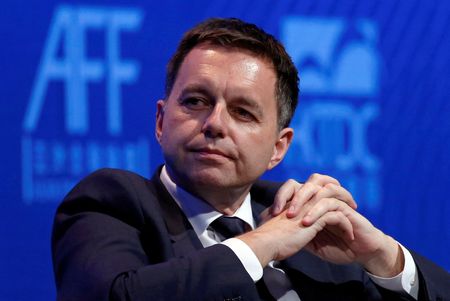 1
1 1
1
By Francesco Canepa
FRANKFURT (Reuters) -Two European Central Bank policymakers on Friday raised the prospect of an end to the ECB’s steepest and longest string of interest rate rises, as the outlook for the euro zone economy worsened despite stubbornly high inflation.
The ECB increased borrowing costs for a ninth consecutive time on Thursday but raised the possibility of a pause in September as recession worries mount.
ECB policymakers Yannis Stournaras and Peter Kazimir both said the end of the tightening cycle was near, although they differed on whether one more rate hike was likely.
“It looks like we are very close to the end of interest rate rises,” Stournaras, the Greek central bank governor and a policy dove who favours lower rates, told capital.gr.
“In any case, if there is one further (rise)- I see it difficult – in September, I believe we will stop there.”
His more hawkish Slovakian colleague Kazimir also said the ECB was “nearing the completion” of its rate hikes but called for “a firm step further”.
“Even if we were to take a break in September, it would be premature to consider it automatically … the end of the cycle,” the Slovak governor said.
Kazimir and Stournaras both said the ECB was unlikely to cut rates for several months after its last increase, a view echoed by their Lithuanian peer Gediminas Simkus.
“We are looking for the right place to stay for a large part of next year,” said Kazimir. “And you will recognise that it has to be a place where we all must like it a little.”
In a likely nod to divisions among the ECB’s 26 rate-setters, he said this was proving “challenging with such a large expedition as the Governing Council.”
DIFFICULT HAND
Surveys on Friday showed ECB policymakers have been dealt a difficult hand.
Core inflation in the euro zone was seen coming down more slowly than previously thought, with wage growth expected to pick up in a tight labour market.
But growth forecasts were revised down for the next two years as well as in the longer term and companies were recording stagnating activity, with no improvement in sight. Sentiment in the industrial sector kept worsening too.
Hard data, which reflects the recent past rather than the present or the outlook, provided some comfort.
Inflation fell in Germany and France, the euro zone’s two largest economies, in July.
GDP readings also showed the French and Spanish economies grew at a sustained pace in the second quarter of the year on the back of stronger exports and tourism.
Industry-heavy Germany stagnated, however, and remained the worst-performer among major euro zone economies.
(Additional reporting by Balazs Koranyi in Frankfurt, Angeliki Koutantou in Athens and Andrius Sytas in Vilnius; Editing by Catherine Evans)